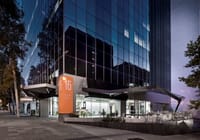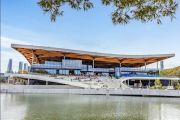
Turnaround story for motels, hospitality’s Cinderella asset
Most Australians think of motels as drive-to-the-door, overnight pit stops in lesser-known regional towns, perhaps where parents took them as kids, lying on plastic banana lounges by the pool on hot summer days.
But the boom in these city-fringe assets that started with the post-COVID surge in domestic tourism has taken a new turn, driven by travellers opting for shorter breaks, the rise of “bleisure” – the blend of business and leisure travel – Instagram and influencer culture, and the rediscovery of nostalgic, retro-style motels.
And with the supply of new motels non-existent, the industry’s revenue has risen – at a compounded annual growth rate of 6.9 per cent since 2020, putting it on track to have reached $3.9 billion in 2025, according to research company IBISWorld. This is creating an opportunity for a new group of investors.
Jason and Eliza Raine rescued the former Palm Beach Motel in the Gold Coast from demolition in 2020 and have since renovated and relaunched the beachside accommodation, now called The Mysa Motel – the Swedish word “mysa” roughly translates to “cosy up” or “snuggle up” in English.
“It was important for us to hang on to the facade of the building,” Jason Raine told The Australian Financial Review.
“The Gold Coast does have a bit of architectural history, but that’s getting knocked over at a rapid rate. It was important for us just to hold on to a little slice of the Gold Coast that’s always been here. We feel that a lot of the locals are happy with what we have done trying to preserve.”
The couple salvaged and repurposed materials from the former 1960s motel such as bricks, mosaic tiles and hardwood ceiling trusses in their restoration efforts, while adding modern touches like solar panels and rainwater tanks to supply its coastal gardens.
They’re not alone in spotting the opportunity.
“One rising segment is the conversion of older legacy motels, which can often be acquired significantly below replacement cost, into boutique properties,” CBRE director and hotel broker Hayley Manvell said.
“[They] command superior room rates and profit uplifts after a modest refurbishment budget based on an aesthetic overhaul, not structural.”
The field of motels, once dominated by mum and dad owner-operators, was also attracting bigger investors, Manvell said.
“There’s been a lot of institutional groups enter the market … with relatively limited capital expenditure on some of these properties. The net profits they can derive and average daily rates are quite, quite impressive,” she said.
One of the largest players in the space is Mandala Hotels and Resorts, which has about 40 motels in its portfolio operating under different business models.
ResortBrokers, a specialist property agency selling accommodation assets, reports a 60 per cent increase in motel transactions since before the COVID pandemic, with motel listing inquiries surging by nearly 130 per cent over the same time.
Trudy Crooks, managing director at ResortBrokers, said the market barely moved before the pandemic, but it had since taken off.
“The activity in the last three years would be more than any movement we saw in the previous decade,” Crooks told the Financial Review. “People have started to understand the regions more. There has been no new supply whilst people have been moving around … we’ve had a perfect storm.”
Investors are too, such as commercial property investment manager Deltine Capital, which has established a fund exclusively around regional and suburban motels across the country.
The Deltine High Yield Motel Fund intends to invest in at least 50 motels with the goal of creating a $500 million portfolio in the next five years, Deltine chief executive David Toomey said.
Toomey, who aims to have the largest owned and operated, single-branded motel chain in the country, said the motel sector represented one of the last truly untapped frontiers in Australian commercial real estate.
“Motels are essential infrastructure for regional Australia, serving a diverse range of business, event and leisure travellers,” he said. “We’re not just investing in properties – we’re investing in communities and building a new standard for regional accommodation.”
To avoid the seasonality of coastal locations, the fund is deliberately avoiding tourism-heavy spots, as well as single-asset exposures, or assets with large food, beverage and gaming operations.
“The motels that we’re targeting are true service providers to these regional towns, the ones that house project workers and government workers,” he said. “There’s a segment of that market that’s very resilient and quite defensive because it is a mainstay of these local economies.”
Deltine Capital has just acquired its first motel as part of the fund, the New Crossing Place Motel, in Seymour, less than 10 minutes from Victoria’s Puckapunyal military base, for $7.5 million. Last year’s turnover was about $1.29 million, and it has a purchase yield of 10.4 per cent.
“With a track record of consistent profitability and a strong repeat customer base, this acquisition is a perfect cornerstone for the portfolio we’re building,” Toomey said.
Whether for business or leisure, there was a niche market of travellers opting to stay in smaller, boutique forms of accommodation as opposed to anything “new and big”, Raine said.
“They want something a bit more authentic and something that may reflect on holidays that they had in the past when they were younger,” he said.














